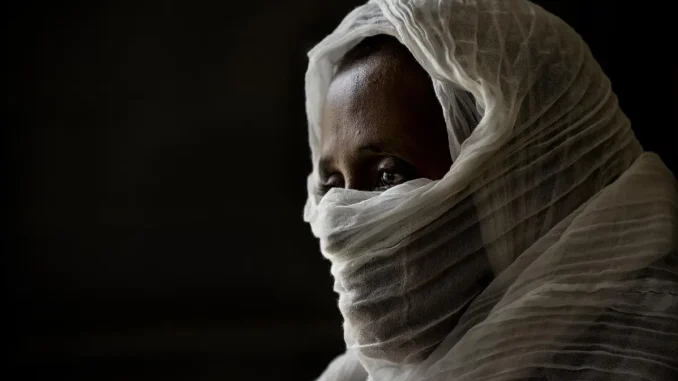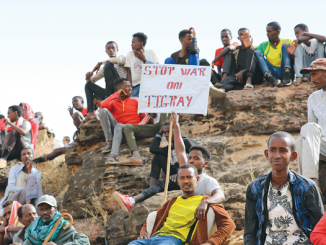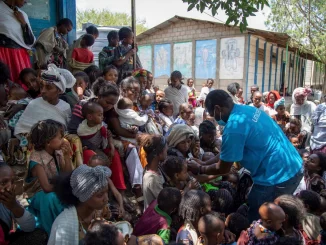
By Maebel Gebremedhin
In the summer of 2023, while I was negotiating the price of a pair of cloud-shaped wire sunglasses, a man walked behind me and sexually assaulted me. I was at a stall in one of the many open-air markets in Mekelle, Ethiopia’s second-largest city. The man touched my body, attempting to feel as much of me as possible. I stood for a few seconds, unsure of what was happening, until his hands went further and his body got closer.
Jolted out of my shock, I turned to face him and started yelling. My mother, who was standing next to me, did her best to defuse the confrontation and quietly shooed the man away. As soon as he left, many people who had witnessed what happened — from the boys selling peanuts nearby to a woman strolling with her children — laughed. The laughter is what stays with me.
It was not the first time I encountered the troubling consequences of sexual assault during my trip to Mekelle last year, nor was it the last. My assault was just one of many painful encounters that highlighted the pervasiveness and intense normalization of sexual violence in Ethiopia, especially in regions like Tigray that are warped by other kinds of violence.
Two weeks earlier, I had flown to Mekelle from Brooklyn. It was the first time I had returned to Ethiopia in 20 years. One of my reasons for visiting was to speak with women who were survivors of conflict-related sexual violence as part of my work with the Tigray Action Committee, a nonprofit my sister and I founded to raise awareness about people’s suffering during the two-year civil war between Ethiopia and Tigray, the country’s northernmost regional state. Many of the women I spoke to were assaulted during the central government’s war on Tigray, which has been described as one of the deadliest of the 21st century to date, with an estimated death toll of over half a million. Although a cease-fire was reached in 2022, sexual violence continued for months after that, countless families remain displaced, and the country is at risk of sliding into famine.
Women in Tigray were subjected to unimaginable crimes during the war and its ongoing, tumultuous aftermath. Over 100,000 women in Tigray are thought to have experienced conflict-related sexual violence. Health experts recently estimated that over 40 percent of Tigray’s women experienced some type of gender-based violence during the war. Most of them — a whopping 89.7 percent — never received any medical or psychological support afterward.
Survivors have reported that foreign objects were inserted in their bodies, that their children were murdered in front of them, that they were forced into sexual slavery, starved and intentionally infected with H.I.V. and other sexually transmitted pathogens. One victim recalled being told that she was being raped because “a Tigrayan womb should never give birth.” Some survivors are now taking care of children fathered by their rapists. Others are likely becoming new survivors of conflict-related sexual violence, with little hope of recourse from the government.
Unfortunately, the women of Tigray are not alone. Conflict-related sexual violence remains a persistent issue across the Horn of Africa. United Nations experts have expressed alarm about the reported widespread use of rape by the Rapid Support Forces in Sudan’s ongoing war, a horror eerily reminiscent of the genocide in Darfur, where women experienced sexual violence en masse. In Eritrea, Tigray’s neighbor to the north, women conscripted into the federal army have reportedly been subjected to sexual violence during compulsory national service. In Somalia, to the east, women living in refugee camps and centers for internally displaced people face gender-based violence in high numbers and are often targeted by predatory clan militias and soldiers. Outside the Horn, the Democratic Republic of Congo has witnessed alarming levels of sexual violence during its continuing conflict, with especially high numbers of child victims.
ALSO READ: Ethiopian PM Abiy, Tigray leaders meet over differences on referendum, drought response
It’s a practice that continues to be used with impunity, despite international pledges to eliminate it. In 2022, President Biden released a memorandum on conflict-related sexual violence, pledging to strengthen the U.S. government’s commitment to combat and hold accountable those responsible for such violence. The European Union continues to release statements on the need to end conflict-related sexual violence worldwide. And U.N. Resolution 1325, passed nearly 25 years ago, calls on “all parties to armed conflict” to take special measures to protect women and girls from gender-based violence in that context, particularly sexual abuse. Yet the violence and impunity continue.
To put an end to conflict-related sexual violence, women’s voices must be included at every level of decision making. Research shows that when women participate in a peace process, it lasts longer; maintaining peace is one way to ensure that conflict-related atrocities do not continue. In Tigray, this will require the active engagement and participation of women in designing and carrying out protective measures, shaping legal and judicial actions and contributing to sustainable peace-building initiatives. One good example to follow would be Liberia, where women, including survivors, spearheaded movements that played a critical role in ending a brutal civil war characterized by extensive rape.
Outside Tigray, the United States and other powers must put pressure on the Ethiopian government to follow the terms of the 2022 cease-fire, which includes a clause about condemning “any act of sexual and gender-based violence,” to allow unfettered humanitarian access and to refrain from restricting or shuttering internet access. International aid organizations must prioritize setting up health care infrastructure for the countless survivors in Tigray today, and local organizations that are committed to this work should be better funded.
The relative Western disregard for the Tigrayan war and the horrific acts of violence against Tigrayan women presents a lesson to learn from; Tigray stands as one of many stark examples of what happens when conflict-related sexual violence goes unchecked. It is time the world speaks up for African women and holds governments, armies and all other perpetrators accountable for the crimes they are committing. If not, they may continue to suspect that when it comes to them, accountability and justice are only buzzwords.
During my trip last summer, I spoke to women in every town I visited, asking about their lives, experiences, hopes and dreams. I asked them if they saw a future for themselves in Tigray or anywhere at all. Overwhelmingly, they said their goal was to leave Ethiopia or to help their children leave if they could not. They wanted their daughters to experience a different life, to have a chance at something else.
• Maebel Gebremedhin is a co-founder and the president of Tigray Action Committee and United Women of the Horn and is the mother of three boys.




